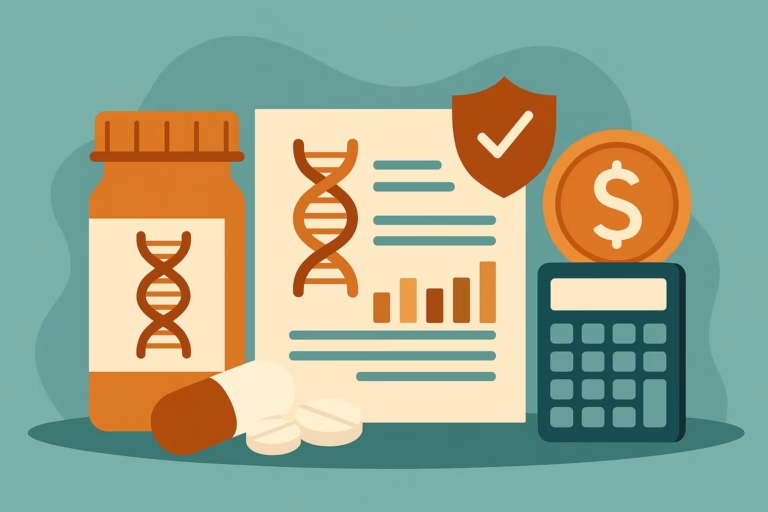A staggering 25% of outpatients are treated with medications that include pharmacogenomic information in the labeling. However, most physicians reported unfamiliarity with pharmacogenomic testing and lacked confidence in using genomic-based technologies in the clinical setting1. This highlights the significant educational gaps in pharmacogenomics that need to be addressed. Ensuring effective implementation of pharmacogenomics in clinical practice is crucial for pharmacogenomics education.
The mean years in postresidency/fellowship practice for survey participants were 10.3 years. They spent an average of 48.6 hours per week in direct patient contact, emphasizing the need for improved training and education in pharmacogenomics1. Approximately 25% of outpatients are treated with medications that include pharmacogenomic information in the labeling. Nearly 10% of patients in the ambulatory setting experience adverse drug reactions (ADRs), leading to an estimated 100,000 deaths annually in the US1.

Educational resources developed to address pharmacogenomic knowledge gaps include continuing medical education programs, print materials, and point-of-care resources. These can help bridge the educational gaps in pharmacogenomics, a key aspect of pharmacogenomics education1. The importance of addressing these gaps cannot be overstated. It has a direct impact on patient care and the effectiveness of pharmacogenomics in clinical practice, underscoring the need for comprehensive pharmacogenomics education.
The Current State of Educational Gaps in Pharmacogenomics
Pharmacogenomics, the study of how genes influence drug responses, is vital for personalized medicine. Yet, there are substantial gaps in pharmacogenomics education, affecting patient care quality. A pharmacogenomics curriculum must incorporate the most recent research and technologies. This is crucial for healthcare professionals to deliver optimal care.
The current educational landscape in pharmacogenomics is marked by a lack of standardization and consistency in pharmacogenomics curriculum across institutions and countries. This results in healthcare professionals being insufficiently prepared to apply pharmacogenomic principles in clinical settings2. To bridge these gaps, it is imperative to establish and implement comprehensive pharmacogenomics education programs. These programs should include the latest research and technologies.
Addressing the gaps in teaching pharmacogenomics poses several challenges:
- Limited integration of pharmacogenomics into existing curricula
- Insufficient training opportunities for healthcare professionals
- Lack of awareness and understanding of pharmacogenomic principles among healthcare professionals2
To overcome these challenges, it is crucial to develop and implement effective pharmacogenomics education programs. These programs should address the gaps in teaching pharmacogenomics. This includes providing healthcare professionals with access to the latest research and technologies, as well as opportunities for training and professional development2.
Understanding the Evolution of Pharmacogenomics Education
Pharmacogenomics education has seen profound transformations, driven by the swift progress in research and technology. The availability of pharmacogenomic tests has surged, thanks to alarming statistics on adverse drug reactions1. This necessitates a heightened awareness among healthcare professionals regarding pharmacogenomics and its clinical applications.
The hurdles in pharmacogenomics education are diverse, encompassing the absence of uniform curricula to the scarcity of resources and training opportunities2. Moreover, the integration of pharmacogenomics into clinical practice faces obstacles due to professionals’ limited awareness and understanding3. To overcome these obstacles, it is crucial to establish and execute effective pharmacogenomics education programs. These programs must strike a balance between theoretical knowledge and practical application in clinical environments.
Enhancing pharmacogenomics education involves several strategies, including interactive learning modules, collaborative teaching methods, and updates to assessment strategies1. Incorporating real-world examples and case studies can also aid in demonstrating pharmacogenomics’ practical value in clinical settings. By employing these strategies, we can enhance healthcare professionals’ ability to integrate pharmacogenomics into practice, ultimately benefiting patient health outcomes.
For further insights into pharmacogenomics education, visit this pharmacogenomics research article3. The article underscores the significance of pharmacogenomics education in enhancing healthcare outcomes and offers perspectives on the current pharmacogenomics education landscape.
Core Competency Shortfalls in Healthcare Programs
Pharmacogenomics knowledge gaps pose a significant challenge in healthcare education. Studies reveal that insufficient knowledge hinders the adoption of pharmacogenomics in clinical settings2. These gaps are prevalent across various educational programs, including medical, pharmacy, and nursing curricula. The absence of thorough training in pharmacogenomics among pharmacists is particularly concerning. It restricts their capacity to deliver tailored care2.
The rapid evolution of pharmacogenomics has outpaced the updates in educational curricula. Consequently, healthcare professionals often lack the competencies to apply pharmacogenomics in their work4. The National Coalition for Health Professional Education in Genetics (NCHPEG) has outlined essential competencies in genetics education. However, integrating these into healthcare programs remains a daunting task4.
To mitigate these shortcomings, it is crucial to establish and execute comprehensive education and training initiatives. These should focus on bridging pharmacogenomics knowledge gaps5. Such programs could include interactive modules, case studies, and hands-on training. By equipping healthcare professionals with the necessary skills and knowledge, we can enhance pharmacogenomics application in clinical settings. This, in turn, will lead to better patient outcomes2.
Barriers to Implementing Comprehensive Pharmacogenomics Training
Implementing comprehensive pharmacogenomics training is essential for improving pharmacogenomics education and tackling the challenges in pharmacogenomics education. Yet, several hurdles impede this process. A significant financial burden for patients is the lack of insurance coverage for pharmacogenomics testing6. Additionally, the complexity of genetic interpretation necessitates specialized expertise and equipment6.
A study revealed that primary care providers often lack knowledge and face perspective barriers, which can be mitigated through educational interventions7. It also highlighted that pharmacogenomics testing is not commonly used in clinical practice, with a lower adoption rate in primary care compared to specialty care settings7. To overcome these hurdles, it is crucial to develop targeted educational programs and raise awareness about the benefits of pharmacogenomics testing.
Some potential solutions to these challenges include:
- Developing online educational resources and training programs for healthcare professionals
- Increasing funding for pharmacogenomics research and education
- Improving insurance coverage for pharmacogenomics testing
By addressing these challenges and barriers, we can strive towards improving pharmacogenomics education. This will ensure that healthcare professionals possess the necessary knowledge and skills to deliver high-quality patient care6.
| Barrier | Solution |
|---|---|
| Lack of insurance coverage | Advocate for increased insurance coverage |
| Complexity of genetic interpretation | Develop specialized training programs |
| Deficits in knowledge and perspective barriers | Develop targeted educational interventions |
Technology Integration Challenges in Teaching Pharmacogenomics
The integration of technology in pharmacogenomics education is vital for crafting effective educational strategies in pharmacogenomics. Yet, several hurdles exist, including the constraints of digital learning platforms and the issue of resource accessibility8. An optimal pharmacogenomic educational resource should be electronic. It should include components such as interpreting test results and prescribing recommendations8.
Some of the primary challenges in technology integration include:
- Digital learning platform limitations: Many platforms lack the necessary tools and features to support comprehensive pharmacogenomics education9.
- Resource accessibility issues: Healthcare professionals in rural or underserved areas may face difficulties in accessing digital resources and pharmacogenomics training10.
- Technical competency requirements: Healthcare professionals need to develop technical competencies to effectively use pharmacogenomic tools and databases8.
Overcoming these challenges is crucial for developing an effective pharmacogenomics curriculum and promoting pharmacogenomics adoption in clinical practice10. By leveraging technology and addressing these challenges, we can enhance the quality of pharmacogenomics education. This, in turn, will improve patient outcomes9.
Clinical Practice Integration Hurdles
Integrating pharmacogenomics into clinical practice is fraught with obstacles, including pharmacogenomics knowledge gaps and the complexity of interpreting and applying test results11. A significant number of physicians expressed uncertainty regarding the appropriate pharmacogenomic tests for various clinical scenarios. This underscores the necessity for clear guidelines and decision support tools12.
The adoption of pharmacogenomics in clinical settings is further impeded by barriers such as inadequate training, insufficient scientific backing, and the high costs of testing13. To overcome these hurdles, it is imperative to establish evidence-based policy documents and operational frameworks. These should facilitate the efficient integration of pharmacogenomics. Below is a table outlining some of the main challenges and potential solutions:
| Challenge | Potential Solution |
|---|---|
| Lack of training | Interprofessional education and training programs |
| Insufficient scientific evidence | Continuing research and development of pharmacogenomics guidelines |
| High testing costs | Insurance coverage and cost-effective testing options |
It is vital to address the challenges in pharmacogenomics education and pharmacogenomics knowledge gaps to ensure pharmacogenomics is effectively integrated into clinical practice11. By creating and implementing thorough training programs, guidelines, and decision support tools, healthcare professionals can deliver personalized care. This approach enhances patient outcomes and decreases healthcare expenditures1213.
Bridging Theory and Practice: Real-world Applications
Enhancing pharmacogenomics education is vital for its practical application in healthcare. It is essential to focus on real-world case studies to equip healthcare professionals for the challenges they will encounter14. This method bridges the gap between theoretical knowledge and practical application, thereby improving patient care.
Practical training is crucial for pharmacogenomics education. It allows healthcare professionals to apply their knowledge in real-world settings, developing the necessary skills for effective pharmacogenomics practice15. Educational programs that offer such opportunities better prepare healthcare professionals for pharmacogenomics demands in clinical practice.
Case Study Implementation
Case studies are invaluable in pharmacogenomics education, providing a realistic view of its application in healthcare14. By examining case studies, healthcare professionals gain a deeper understanding of how pharmacogenomics influences treatment decisions and enhances patient outcomes.
Practical Training Opportunities
Hands-on training is essential for enhancing pharmacogenomics education. It enables healthcare professionals to apply their knowledge and skills in practical settings, boosting their competence in pharmacogenomics15. This, in turn, leads to better patient care and more effective use of pharmacogenomics in clinical practice.
Professional Development and Continuing Education Needs
Pharmacists trained before 2010 lacked formal pharmacogenomics education, underscoring the necessity for continuous professional development in this area16. The dearth of familiarity with pharmacogenomics testing technologies among healthcare providers hinders its adoption. Educational shortcomings in pharmacogenomics exacerbate suboptimal medication management and elevate the risk of adverse drug reactions16.
To bridge these educational gaps in pharmacogenomics, professional bodies can offer continuing education through online modules, workshops, and certification programs. These initiatives enable pharmacists to remain abreast of pharmacogenomics advancements. They also enhance pharmacists’ abilities to interpret genetic test results and make informed prescribing decisions1. Furthermore, incorporating pharmacist training in pharmacogenomics into existing healthcare curricula ensures pharmacists are prepared to deliver personalized medicine. This, in turn, improves patient outcomes3.
Continuing education in pharmacogenomics should focus on interpreting test results, prescribing recommendations, and identifying high-risk population subgroups1. By addressing these knowledge gaps, pharmacists can enhance patient care and improve health outcomes. This, in turn, reduces the risk of adverse drug reactions and boosts drug efficacy16.
Innovative Solutions for Pharmacogenomics Education
Enhancing pharmacogenomics education is vital for the advancement of educational strategies in pharmacogenomics. The University of Minnesota College of Pharmacy has introduced a certificate-granting pharmacogenomics training program. It targets practicing pharmacists in rural and underserved areas. This initiative exemplifies the integration of personalized medicine and pharmacogenomics into healthcare education.
Innovative methods, such as interactive learning modules and collaborative teaching, are being employed to bridge educational gaps in pharmacogenomics. These strategies aim to engage learners, equipping them with the knowledge and skills to apply pharmacogenomics in clinical settings. For example, pharmacogenomic-guided dosing has been proven to enhance response and remission rates in specific patient populations17.
Interactive Learning Modules
Interactive learning modules are a potent tool for enhancing pharmacogenomics education. These modules incorporate simulations, case studies, and interactive components. They enable learners to apply their knowledge in practical scenarios. This method fosters a more engaging and effective learning environment, ultimately enhancing improving pharmacogenomics education.

Collaborative Teaching Approaches
Collaborative teaching methods unite experts from diverse fields to educate on pharmacogenomics. This strategy enriches learners’ understanding by exposing them to expertise from various disciplines. Through collaboration, educators can craft a more impactful and engaging educational experience. This, in turn, fosters superior educational strategies in pharmacogenomics.
| Approach | Description |
|---|---|
| Interactive Learning Modules | Simulations, case studies, and other interactive elements |
| Collaborative Teaching Approaches | Experts from various disciplines working together |
By adopting these innovative strategies, educators can significantly enhance pharmacogenomics education. This improvement will lead to enhanced patient outcomes and more tailored treatment plans17. The escalating demand for personalized medicine and the acknowledgment of genetic variations’ significance are fueling the rapid expansion of the pharmacogenomics market18.
Global Perspectives and Cultural Considerations
Pharmacogenomics education transcends geographical boundaries, with each region presenting its own set of challenges and perspectives. The University of Minnesota’s study focused on pharmacists serving rural and underserved populations, including diverse communities such as American Indian, US Hmong, Karen, and Somali19. This underscores the imperative for pharmacogenomics education to cater to the unique needs of diverse populations.
Regional educational disparities play a pivotal role in pharmacogenomics education. A comprehensive review of 52 studies from 26 countries revealed that pharmacists and pharmacy students generally hold positive attitudes towards pharmacogenomics20. However, they often lack the necessary knowledge and confidence. This highlights the necessity for international cooperation and the establishment of standardized pharmacogenomics education.
Key Considerations
- Cultural competency integration: Pharmacogenomics education must take into account the cultural beliefs and values of diverse populations.
- International collaboration: Collaboration between countries and regions is essential for developing standardized pharmacogenomics education.
- Regional educational differences: Pharmacogenomics education must address the unique needs and challenges of different regions and countries.
Addressing educational gaps in pharmacogenomics is critical for ensuring equitable and effective application of pharmacogenomics globally. By integrating global perspectives and cultural considerations, pharmacogenomics education can be tailored to meet the needs of diverse populations. This will ultimately enhance healthcare outcomes1920.
Charting the Path Forward: Transforming Pharmacogenomics Education
The evolution of pharmacogenomics necessitates addressing educational gaps. Healthcare professionals must acquire the knowledge and skills for personalized medicine21. A comprehensive strategy is needed, including curriculum reforms, technology integration, professional development, and collaboration between academia, healthcare, and industry.
Integrating pharmacogenomics into medical, pharmacy, and nursing curricula is essential. It should balance theory, practical case studies, and hands-on training for real-world application22. Interactive learning modules and collaborative teaching methods can enhance the learning experience and foster engagement.
Continuous professional development is vital for healthcare professionals. Institutions should invest in training programs to keep them updated on pharmacogenomics advancements21. Workshops, webinars, and mentorship programs can ensure clinicians integrate pharmacogenomics into practice seamlessly.
Addressing disparities in pharmacogenomics research and education globally is crucial21. Global collaboration and knowledge-sharing are essential. International partnerships can share best practices, resources, and develop culturally-sensitive programs for diverse regions.
Implementing these strategies will bridge educational gaps in pharmacogenomics22. Healthcare professionals will be empowered to provide personalized, evidence-based care. This approach will improve patient outcomes and make personalized medicine the standard of care.
Source Links
- Pharmacogenomic knowledge gaps and educational resource needs among physicians in selected specialties – https://pmc.ncbi.nlm.nih.gov/articles/PMC4100727/
- Advancing Education And Awareness Of Pharmacogenomics: Insights From Recent Publications – A Review – https://www.ijpsjournal.com/article/Advancing Education And Awareness Of Pharmacogenomics Insights From Recent Publications A Review
- Development of the pharmacogenomics and genomics literacy framework for pharmacists – Human Genomics – https://humgenomics.biomedcentral.com/articles/10.1186/s40246-021-00361-0
- Recommendations of core competencies in genetics essential for all health professionals – Genetics in Medicine – https://www.nature.com/articles/gim200130
- The needs and gaps in pharmacogenomics knowledge and education among healthcare professionals in Malaysia: A multisite Delphi study – https://pmc.ncbi.nlm.nih.gov/articles/PMC11551526/
- A Theory-Informed Systematic Review of Barriers and Enablers to Implementing Multi-Drug Pharmacogenomic Testing – https://pmc.ncbi.nlm.nih.gov/articles/PMC9696651/
- Untitled – https://digitalcommons.liberty.edu/cgi/viewcontent.cgi?article=3575&context=doctoral
- Integrating Pharmacogenomics Into Treatments: Rationales, Current Challenges, and Future Directions | Published in Georgetown Medical Review – https://gmr.scholasticahq.com/article/37021-integrating-pharmacogenomics-into-treatments-rationales-current-challenges-and-future-directions
- Pharmacogenomics: Challenges and Future – https://www.mdpi.com/2073-4425/15/6/714
- Advancements in Pharmacogenomic Testing: Implications for Drug Development – https://www.linkedin.com/pulse/advancements-pharmacogenomic-testing-implications-drug-miranda-gbyvc
- Pharmacogenomics Implementation and Hurdles to Overcome; In the Context of a Developing Country – https://pmc.ncbi.nlm.nih.gov/articles/PMC8842599/
- Approaches and hurdles of implementing pharmacogenetic testing in the psychiatric clinic – https://pmc.ncbi.nlm.nih.gov/articles/PMC11114389/
- Scoping review of enablers and challenges of implementing pharmacogenomics testing in the primary care settings – https://bmjopen.bmj.com/content/14/11/e087064
- Genomics and Pharmacogenomics Knowledge, Attitude and Practice of Pharmacists Working in United Arab Emirates: Findings from Focus Group Discussions—A Qualitative Study – https://pmc.ncbi.nlm.nih.gov/articles/PMC7563679/
- Bridging Theory with Practice – IIP – https://iip.indoreinstitute.com/blog-post/innovative-research-projects-bridging-theory-with-practice/
- PGx Patients Facing Resistance from Providers Due to an Educational Gap – https://www.linkedin.com/pulse/pgx-patients-facing-resistance-from-providers-due-gap-celeste-miranda-ogiic
- Clinical Application and Educational Training for Pharmacogenomics – https://www.mdpi.com/2226-4787/8/3/163
- Advancements in Pharmacogenomics: A Deep Dive into the Latest Research and Innovations – https://www.linkedin.com/pulse/advancements-pharmacogenomics-deep-dive-latest-research-miranda-7c3bc
- Development of the pharmacogenomics and genomics literacy framework for pharmacists – https://www.ncbi.nlm.nih.gov/pmc/articles/PMC8520199/
- Knowledge, perceptions, and attitudes toward pharmacogenomics among pharmacists and pharmacy students: A systematic review – https://pmc.ncbi.nlm.nih.gov/articles/PMC10809028/
- One Step Ahead in Realizing Pharmacogenetics in Low- and Middle-Income Countries: What Should We Do? – https://pmc.ncbi.nlm.nih.gov/articles/PMC11512769
- Moving Pharmacogenetics into Practice: It’s All About the Evidence! – https://pmc.ncbi.nlm.nih.gov/articles/PMC8376790/






One Comment